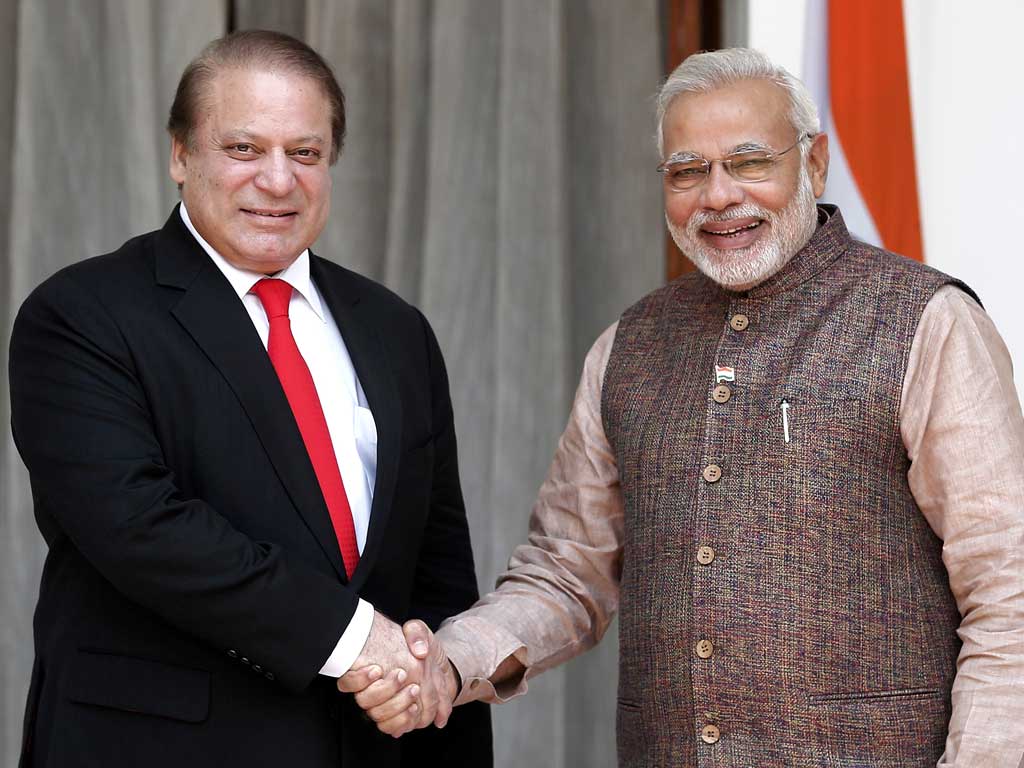India And Pakistan Hold up SAARC Yet Again
Nawaz Sharif and Narendra Modi

NEW DELHI: Hostilities between India and Pakistan are again all set to make the ongoing SAARC summit a non-event.
Except for providing a platform for the South Asian leaders to make speeches and underline their respective pet causes, SAARC is again in danger of being reduced to a non-performing platform by India and Pakistan who cannot see eye to eye on any one issue because of continuing bilateral tensions.
Feeble back channel efforts, with Pakistan more keen than India, to facilitate a meeting between Prime Minister Narendra Modi with PM Nawaz Sharif clearly failed to take off. And it was made clear from the onset that while PM Modi would meet the other South Asian leaders bilaterally, a similar meeting with his Pakistani counterpart was not on the cards.
South Asian heads of government have often, in similar meetings in the past spoken of the vexed relations between the two countries that impact on the progress of the SAARC charter per se. "More often than not, India-Pakistan disputes have overshadowed the organization," Nepal's former prime minister, Baburam Bhattarai, wrote in the Republica newspaper this time, "It is now time for India to take the lead."
Pakistan and Nepal have both supported the inclusion of China from observer, to full member status. India is clearly opposed to this. It might be recalled that China that has expanded its role dramatically in South Asia over the years was brought in as an observer at the instance of Bangladesh under Khaleda Zia, along with the other countries at the summit in Dhaka. India brought in Afghanistan that was eventually lifted to full member status in 2007. However, China remains blocked by India that is not keen to bring the larger country into the forum as it would end its domination.
Pakistan has made a “policy statement” to bring in China that has also sent a high level delegation to Kathmandu to press its case. Indian Ministry of External Affairs spokesperson Syed Akbaruddin said, “We need to first deepen our cooperation within SAARC… there are so many shortcomings and we need to tackle them.” He said the “observers are peripheral… we will come to them at a later stage.”
China’s Deputy Foreign Minister Liu Zhenmin is leading the Chinese delegation to SAARC. The Chinese Xinhua news agency that has expanded its presence in South Asia considerably over recent years, has brought out a 12 page special edition for the summit. Senior Nepal ministers have supported China’s induction as a member, along with Pakistan. Reports suggest that Sri Lanka and Bangladesh are not averse to China either though have not spoken out openly.
SAARC summits have all been about rhetoric, with a common currency, a visa free regime being touted by the respective leaders. Despite the talk South Asian nations conduct only about five per cent of their total trade with each other. PM Sharif spoke at length about a ‘dispute free South Asia where instead of fighting each other we jointly fight poverty”. PM Modi spoke about terrorism, recalling the Mumbai terror attacks, and the need for all South Asian nations to fight terrorism together. The summit opened on the anniversary of the 2008 terror attack on Mumbai by Pakistani militants that killed 166 people.
India and Pakistan officials accused each other of blocking economic, power, transport proposals as always. SAARC summits bring together leaders from Afghanistan, Bangladesh, Bhutan, India, the Maldives, Nepal, Pakistan and Sri Lanka with all of them having failed to break the logjam that has made the forum fairly redundant.
India would have liked to convert SAARC into a counterweight against China but is not going to succeed given its increasing influence on the region. "China attaches great importance to SAARC's status and function," a Foreign Ministry spokeswoman told reporters in Beijing ,"China is also willing to elevate the level of its relationship."



